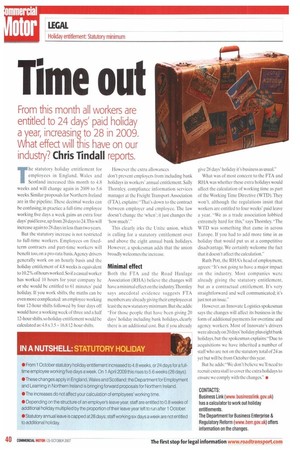Time out
Page 40

If you've noticed an error in this article please click here to report it so we can fix it.
From this month all workers are entitled to 24 days' paid holiday a year, increasing to 28 in 2009. What effect will this have on our
industry? Chris Tindall reports.
The statutory holiday entitlement for employees in England. Wales and Scotland increased this month to 4.8 weeks and will change again in 2009 to 5.6 weeks. Similar proposals for Northern Ireland are in the pipeline. These decimal weeks can be confusing; in practice a full-time employee working five days a week gains an extra four days' paid leave, up from 20 days to 24.This will increase again to 28 days in less than two years.
But the statutory increase is not restricted to full-time workers. Employees on fixedterm contracts and part-time workers will benefit too, on a pro-rata basis, Agency drivers generally work on an hourly basis and the holiday entitlement of 4.8 weeks is equivalent to 10.2% of hours worked. So if a casual worker has worked 10 hours for your company he or she would be entitled to 61 minutes' paid holiday. If you work shifts, the maths can be even more complicated: an employee working four 12-hour shifts followed by four days off would have a working week of three and a half 12-hour shifts so holiday entitlement would be calculated as:4.8 x 3.5 = 16.812-hour shifts. However the extra allowances don't prevent employers from including bank holidays in workers' annual entitlement. Sally Thornley. compliance information services manager at the Freight Transport Association (FTA), explains: "That's down to the contract between employer and employee. The law doesn't change the 'when"; it just changes the 'how much': This clearly irks the Unite union. which is calling for a statutory entitlement over and above the eight annual bank holidays. However, a spokesman adds that the union broadly welcomes the increase.
Minimal effect
Both the FTA and the Road Haulage Association (RHA) believe the changes will have a minimal effect on the industry.Thornley says anecdotal evidence suggests FTA members are already giving their employees at least the new statutory minimum. But she adds: "For those people that have been giving 20 days' holiday including bank holidays, clearly there is an additional cost. But if you already give 28 days' holiday it's business as usual."
What was of most concern to the FTA and RHA was whether these extra holidays would affect the calculation of working time as part of the Working Time Directive (WTD).They won't, although the regulations insist that workers are entitled to four weeks' paid leave a year. "We as a trade association lobbied extremely hard for this," says Thornley. "The WTD was something that came in across Europe. If you had to add more time in as holiday that would put us at a competitive disadvantage. We certainly welcome the fact that it doesn't affect the calculation."
Ruth Pot 1, the RHA's head of employment, agrees: "It's not going to have a major impact on the industry. Most companies were already giving the statutory entitlement, hut as a contractual entitlement. It's very straightforward and well communicated; it's just not an issue."
However, an Innovate Logistics spokesman says the changes will affect its business in the form of additional payments for overtime and agency workers. Most of Innovate's drivers were already on 20 days' holiday plus eight bank holidays, but the spokesman explains: "Due to acquisitions we have inherited a number of staff who are not on the statutory total of 24 as yet hut will be from October this year.
But he adds: "We don't believe we'll need to recruit extra staff to cover the extra holidays to ensure we comply with the changes.•
CONTACTS: Business Link (www.husinesslink.gov.uk) has a calculator to work out holiday entitlements.
The Department for Business Enterprise & Regulatory Reform (www.herr.goy.uk) offers information on the changes.


























































































































































































